The origins of NUKU, a social enterprise made by and made for Indigenous women, are as meaningful as the movement itself. For founder Qiane Matata-Sipu, the creation of her storytelling platform came out of the darkness and into the light.
“I was in this period of my life that was extremely dark – I don’t label it as depression, because from a te ao Māori perspective, I was just hanging out with Whiro. If you think about the maramataka – the Māori lunar calendar – Whiro is the new moon, the darkest time of the month. Whiro is also the god of disease. It was a very difficult time.”
It was a time of grief, Qiane says. The sudden and unexpected death of her beloved grandmother, who had helped raise her, came during a six-year fertility treatment journey for Qiane and her husband Willie. “I wasn’t yet a mother and I was really questioning who I was – as an Indigenous woman, as a wahine. Who was I from a career perspective, who was I as a woman who can’t have children.”
Looking for connection, Qiane said the endless disappointment of social media was just as isolating – “people sharing photos of their food, people living these fake lives. There was nothing I could grasp onto that would help me get through.”
After over a decade working as a journalist, editor, artist and photographer, Qiane knew that there was an appetite for Indigenous stories but, there wasn’t a platform that solely celebrated Indigenous women in all their wonderful and complex glory. The idea of creating her own magazine had been on the back burner for a while, but it never felt right. “I started to think about what it means to be a woman today and where we get our wisdom from. I really missed being able to talk to my friends or whānau – without phones, without any other distractions. Just have a kai, a cup of tea and a kōrero. I realised that that’s what my grandmother had always been to me – someone to have a genuine, raw and real conversation with, about everything.”
This laid the groundwork for what would eventually become NUKU. “When I think about it in a Māori context, our world came from nothing, Te Kore. Then it went into Te Pō and Te Ao Mārama; the darkness and then the light. When you think of any idea that comes about, that’s the process it takes. And the light came for me when I fell pregnant, miraculously, naturally.”
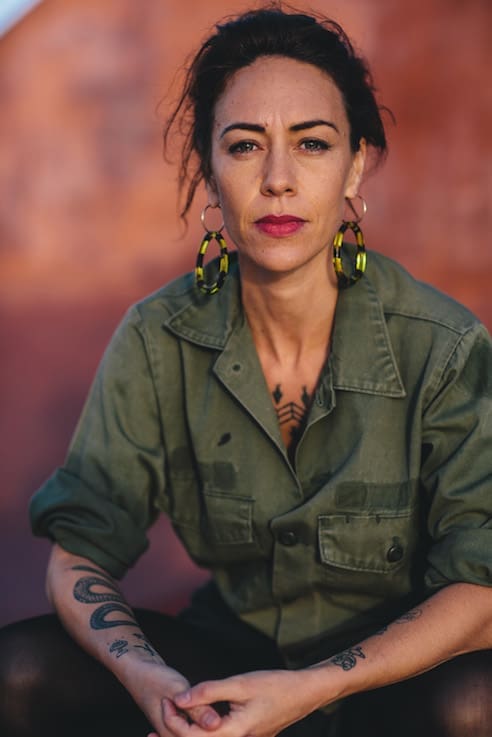
Damaris Coulter and Dr Diana Kopua (right), two of the wāhine featured in NUKU’s story collection. [Photo credit: Qiane Matata-Sipu/NUKU] 
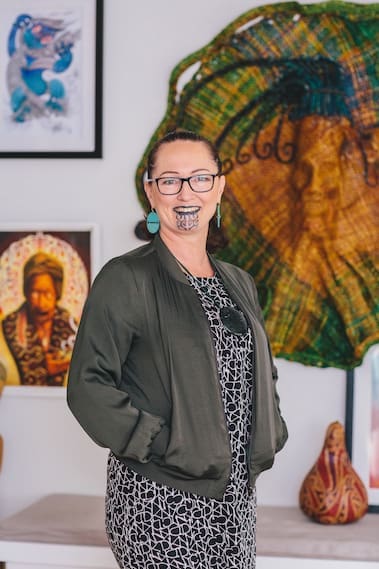
Knowing she was pregnant with a girl, Qiane’s original idea of creating a magazine for wāhine came back to her. “I started to think about what I wanted for my baby and what skills I wanted her to have, so she would have a better life as an Indigenous woman in this world.” Very quickly, her idea took shape. It wouldn’t be a magazine, it would be a multimedia series profiling 100 Indigenous women: a portrait photoshoot, an audio podcast and behind the scenes video for each one, that would then be turned into a book. “I thought, ‘I’m going to show my daughter that there are 100 women that she could be, if she wanted to. But I’m also going to show her authenticity – I want people to talk about what’s ugly in their lives, what’s beautiful, what’s easy and what’s hard.”
“NUKU” is derived from Papatūānuku, meaning earth mother – but the “ultimate female essence,” Qiane says. She launched NUKU with 10 different stories from 10 “kick-ass Indigenous wāhine” and held the project launch at the Māngere Arts Centre – Ngā Tohu o Uenuku. It was immediately clear this was a kaupapa that was going to resonate with people – they catered for 100, in the arts centre that held 300 people, seated. On the night itself, it was standing room only. “It was a very moving day for me, because it meant that other women wanted this too. Other women wanted authenticity and they wanted to hear it from other Indigenous women – they wanted these stories and they wanted to see these images. Suddenly it became more than a project.”
This November, NUKU will hit 50 women. It is a great privilege and honour, Qiane says, that her job has become championing Indigenous women and amplifying their voices. The range of wāhine featured on NUKU spans a broad cross-section of Aotearoa – ages, jobs, ethnicities, LGTBQIA+, disability advocates. Years of working in media taught Qiane how limited the options can be for Indigenous people – “Either it’s the token ‘Māori language week’ or ‘Matariki’, or it’s negative stories. While I may have seen people who looked like me on TV, it wasn’t ever a reflection of my lived experience.”

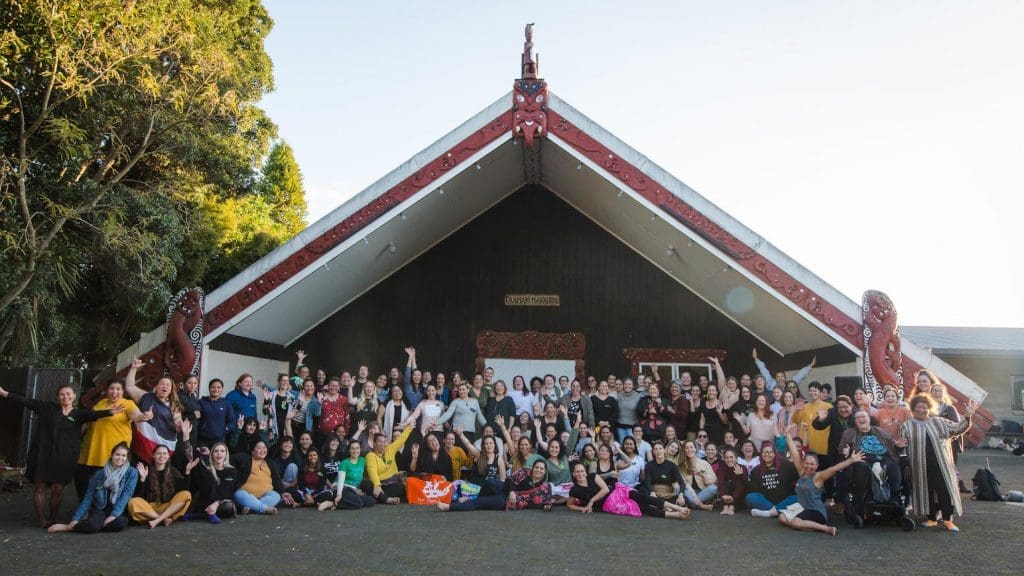
Last year’s NUKU event
The movement has expanded to experiences as well – as part of the Elemental festival in Auckland, both last year and this year, NUKU was asked to put on an event, welcoming wāhine from all sorts of walks of life and different generations to meet in one place and share that collective wisdom that NUKU is all about. Mixing Indigenous knowledge with modern concerns like entrepreneurship and business, these events are held at Makaurau Marae in Auckland’s area of Ihumātao, where Qiane and several generations of her family live.
It is not easy work – NUKU is entirely reliant on koha to keep the movement alive – but it is work that Qiane and the NUKU team are deeply passionate about. With both the stories and the events, NUKU is about the shared power and wisdom of women – and the effects of that will be felt for a long time. “During lockdown, I had women reaching out to me saying they were home schooling their kids by getting them to write reports on the NUKU women. That is the greatest compliment I could ever receive for NUKU,” Qiane says. “You can’t measure the impact of NUKU right now – it’s something we will measure over time, possibly not for a generation. But this series is capturing Indigenous women’s stories right now – so it’s history… and Haeata te Kapua, my two-and-a-half-year-old, gets to see all of this. Yes, she gets to see her mother work too much” – Qiane laughs – “but she’s seeing the generosity and authenticity of what it means to be a woman today.”

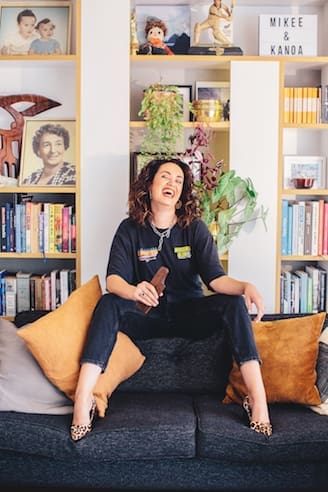
Kanoa Lloyd and Kim Tairi (right) are also featured in NUKU’s story collection of 100 Indigenous Women [Photo credit: Qiane Matata-Sipu/NUKU] 
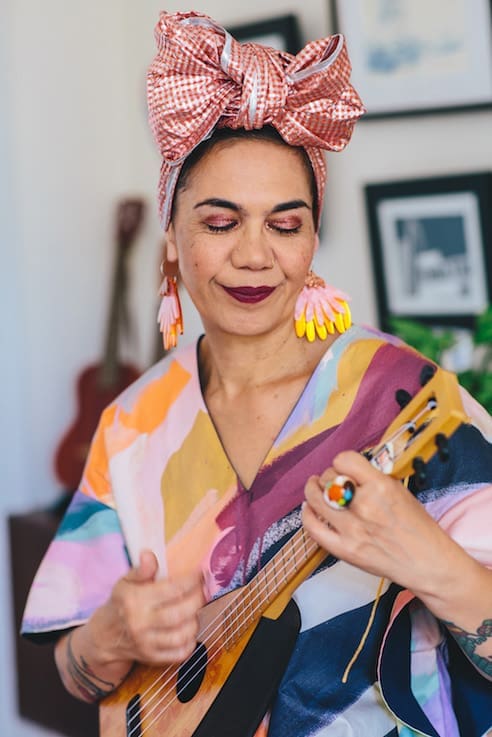
For more information on NUKU Live 2.0, visit here. For more information on the Elemental Festival, on now, visit here. For more information on NUKU, visit here and to support their kaupapa, visit here

